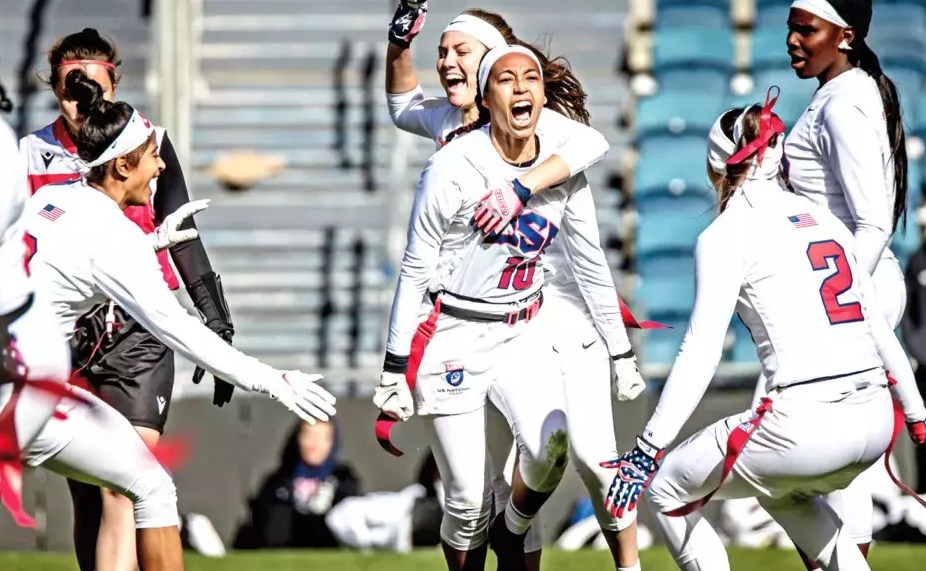Flag football, a non-contact version of American football, is one of the nine sports being considered for inclusion in the 2028 Olympic Games in Los Angeles. The sport has been growing in popularity across the U.S. and internationally, especially among youth and women. The NFL, the world’s richest sports league, is backing the bid to make flag football an Olympic sport, hoping to expand its global fan base and revenue.
What is flag football and how is it played?
Flag football is a variation of American football that replaces tackling with pulling a flag or a belt attached to the ball carrier. The game is played on a smaller field than traditional football, with fewer players on each team. The rules vary depending on the league or organization, but generally there are four downs to advance the ball 10 yards, and touchdowns are worth six points. There are no kickoffs or extra points, and turnovers result in a change of possession.
Flag football is designed to be safer and more accessible than tackle football, as it reduces the risk of injuries and does not require expensive equipment or protective gear. The sport also promotes physical fitness, teamwork, and sportsmanship among participants of all ages, genders, and skill levels.
Why is flag football being considered for the Olympics?
Flag football has been gaining momentum as a potential Olympic sport, thanks to the efforts of several organizations and stakeholders. The International Federation of American Football (IFAF), the governing body for the sport worldwide, has been organizing flag football tournaments and championships since 2002. The IFAF has 71 member nations across six continents, and claims that more than 30 million people play some form of American football globally.
The NFL, which already hosts regular-season games in Europe and other regions, is also supporting the Olympic bid for flag football. The league sees the sport as a way to introduce new audiences to American football and grow its international market. The NFL has been investing in flag football programs and events, such as the NFL FLAG Championship, which features teams from the U.S. and other countries. The league also partnered with the International World Games Association (IWGA) to showcase flag football at the World Games 2022 in Birmingham, Alabama, where it will be played for the first time at an international multi-sport event.
The Olympic Games have been adding new sports and disciplines to attract younger and more diverse viewers, as well as to reflect the host city’s culture and preferences. For example, skateboarding, surfing, sport climbing, and karate will debut at the Tokyo 2020 Games, while breakdancing will join the Paris 2024 Games. Los Angeles 2028 organizers have the option to propose additional sports that are popular or relevant in the U.S., such as baseball-softball, lacrosse, squash, cricket, karate, kickboxing, and motorsports.
Flag football fits the criteria of being a sport that appeals to youth, women, and minorities, as well as being widely practiced and followed in the U.S. According to a survey by the Sports & Fitness Industry Association (SFIA), flag football was the fastest-growing team sport in the U.S. from 2014 to 2019, with a 38% increase in participation. The sport also has a strong presence in schools and colleges, with more than 500 varsity teams competing in the National Intramural-Recreational Sports Association (NIRSA) Flag Football Championships.
What are the chances and challenges of flag football becoming an Olympic sport?
The decision on which sports will be added to the Los Angeles 2028 Games was supposed to be finalized last week, but it was postponed as the IOC and LA organizers try to reach an agreement on the number and nature of the new sports. The IOC has set a limit of 10,500 athletes and 310 events for each edition of the Games, which means that some existing sports may have to reduce their quota or be dropped altogether to make room for new ones.
Flag football faces some competition from other sports that are also vying for Olympic inclusion, such as lacrosse, squash, cricket, baseball-softball, karate, kickboxing, and motorsports. Some of these sports have larger or more established international federations than flag football, or have been previously featured in the Olympics or other major events.
Flag football also faces some skepticism from critics who question its legitimacy as an Olympic sport or its appeal to a global audience. Some argue that flag football is too similar to American football, which is not widely played or followed outside of North America. Others contend that flag football is not a true sport but a recreational activity that lacks athleticism or skill.
However, proponents of flag football point out that the sport has many advantages over tackle football or other sports in terms of safety, accessibility, diversity, and entertainment value. They also cite examples of other sports that have successfully made their Olympic debut despite being unfamiliar or unpopular in some regions, such as rugby sevens or curling.
Ultimately, the fate of flag football as an Olympic sport will depend on the IOC’s evaluation of its potential to enhance the Games and its alignment with the Olympic values and vision. If flag football makes the cut, it could be a historic moment for the sport and its fans, as well as a boost for the NFL and its global ambitions.

